
views
Just a few days ago, when the Election Commission team led by Chief Election Commissioner Rajiv Kumar arrived in Srinagar on a three-day visit, political parties — including Omar Abdullah’s National Conference, Mehbooba Mufti’s Peoples Democratic Party, and the state unit of the BJP — asked them for simultaneous assembly polls along with the General Elections.
The last assembly election in J&K was held in 2014 when BJP formed a government along with PDP. In 2018, BJP come out of the alliance and, ever since, the former state — which subsequently became a Union Territory in 2019 after the abrogation of Article 370 and Article 35A — has been without any elected government. In fact, last year, the apex court asked for elections to be conducted by September 2024.
So why is the poll body not holding simultaneous assembly polls when they are already conducting a nationwide General Election in the world’s biggest democracy?
There seem to be three reasons behind the EC’s decision to not yield to overwhelming public sentiments in the Valley despite knowing very well it has to complete the exercise in the next six months.
WOULD NEED MORE FORCE
Conducting simultaneous assembly polls in Jammu and Kashmir along with the Lok Sabha election would require a vast number of additional forces, given the history of the Union Territory.
There are about 635 companies in J&K for the Lok Sabha election. Each company consists of 100 troops, which translates to 63,500 troops. A simultaneous assembly election would require an additional 700 companies or 70,000 troops.
Such a number would not be available as 3,50,000 troops are pressed into action from Maharashtra to Manipur for conducting the Lok Sabha polls. In West Bengal alone, which has a history of poll violence, there are 900 companies or 90,000 troops.
The EC also had to factor in the security of candidates in J&K. “We have to send at least two station forces for every candidate standing. So, having elections together will be a strain for security forces,” said CEC Kumar.
LEGISLATIVE HURDLES
The Election Commission has gone on record to cite legislative hurdles as one of the reasons it can’t go ahead with parallel polls in J&K.
Kumar elaborated: “The J&K Reorganisation Act and the Delimitation Act were not in sync. This was set right only in December 2023, when the J&K Reorganisation Amendment Act was passed. Hence, we are not able to conduct it together with the general elections.”
The first bifurcated the state of Jammu and Kashmir into the Union Territory of Jammu and Kashmir and the Union Territory of Ladakh. It provides legislative and executive powers related to state matters for Parliament to administer the UTs. As for the latter, the report was released on May 5, 2022, under which an additional six seats were added to Jammu division and one seat to the Kashmir division, taking the total tally to 90 seats. Nine assemblies have now been reserved for STs of which six are in the Jammu region and three in the Valley. Both have been upheld at the highest court of the law but are yet to be synced to hold a smooth election process.
THE AMARNATH YATRA FACTOR
The famous Amarnath Yatra this year will start from July 1, 2024. Though the Lok Sabha election ends on June 19, there needs to be dedicated focus on the pilgrimage, not only for smooth passage but also for heightened security. This will make the strain on security forces a lingering issue.
According to the government-run All India Radio (AIR), more than 60,000 paramilitary personnel were deployed across Jammu and Kashmir for the 2023 Amarnath Yatra. Even the Army chipped in for round-the-clock monitoring and special surveillance squads for the routes, including three-tier security, aerial surveillance, and radio frequency identification tags (RFID) tags for all pilgrims.
All district magistrates, police superintendents and their deputies have a lot on their plate during this time of the year. Holding an election just before the Yatra starts could be counterproductive, given the civil administration will have to be on its toes again for the pilgrimage.
WHAT HAPPENS NOW?
The yatra will end on August 19, 2024. Meanwhile, the Constitution Bench of the Supreme Court ordered the Election Commission last year to conduct elections to the Jammu and Kashmir Assembly before September 30, 2024.
Even if one presumes that the EC moves the SC with a fresh plea to extend the timing, the Valley by then will be in the grip of autumn, followed by a harsh winter, which is not conducive for holding elections.
So, essentially, right after the Yatra is over, a tired civil administration and the EC will have a small window of 41 days to hold the first assembly election in Jammu and Kashmir ever since its special status was revoked on January 5, 2019.




















Comments
0 comment